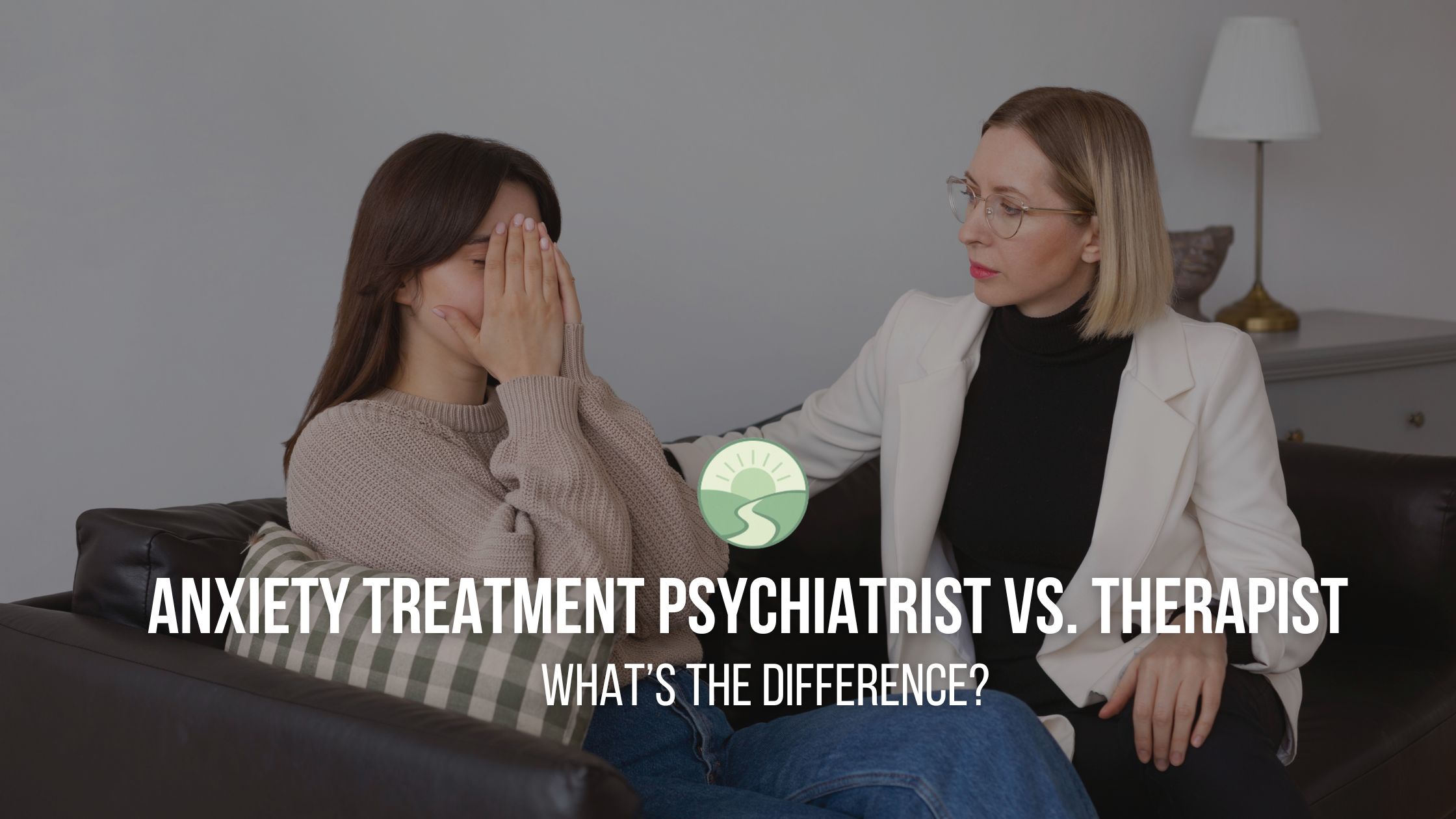When you’re dealing with anxiety, the choice between an anxiety treatment psychiatrist in Maryland and a therapist can feel overwhelming. Both professionals can play an important role in mental health recovery, but their approaches, qualifications, and tools are different.
Making the right decision starts with understanding what each professional does, the kinds of treatments they offer, and how they can work together to help you manage symptoms more effectively.
Why the Right Specialist Matters?
Choosing the right mental health professional is more than a matter of convenience — it’s a matter of getting the right care at the right time.
If you’ve been searching for mental health treatment near me, you might have already seen options for psychiatrists, psychologists, and other mental wellness providers. However, knowing the distinctions helps you make a decision that supports long-term well-being.
1. The Core Difference in Training
One of the biggest differences between these two roles lies in their education and training.
- Psychiatrists are medical doctors who can diagnose conditions, prescribe medications, and oversee treatment plans that combine medication with other methods.
- Therapists (including psychologists and clinical social workers) generally focus on talk-based strategies, coping skills, and emotional support.
Because psychiatrists can prescribe medication, they are often recommended for moderate to severe anxiety cases, while therapists are well-suited for skill-building and ongoing emotional processing.
2. What a Psychiatrist Offers for Anxiety
Anxiety can be complex — sometimes rooted in brain chemistry, sometimes in life experiences, often in both. Psychiatrists focus on identifying the biological aspects and treating them with the right medical approach.
Common services include:
- Comprehensive evaluation to understand your medical and mental health history.
- Medication management services for anxiety, panic disorders, or related conditions.
- Adjusting prescriptions for optimal results and fewer side effects.
- Collaboration with other mental health professionals to ensure well-rounded care.
Psychiatrists are particularly helpful if your symptoms significantly interfere with daily functioning or if other forms of treatment haven’t provided enough relief.
3. What a Therapist Brings to Treatment
Therapists, unlike psychiatrists, focus primarily on helping you develop tools and strategies to cope with anxiety in everyday life.
They may help with:
- Recognizing triggers and thought patterns.
- Developing relaxation and grounding techniques.
- Building healthy routines and boundaries.
- Offering a safe space to discuss fears and concerns.
While therapists cannot prescribe medication, they can play a powerful role in long-term progress. In many cases, patients benefit from working with both a psychiatrist and a therapist at the same time.
4. Deciding Which One You Need First
If you’re unsure whether to start with a psychiatrist or a therapist, consider the severity and urgency of your symptoms.
You might begin with a psychiatrist if:
- Anxiety symptoms are severe or disabling.
- You suspect a medical cause or imbalance.
- You’ve tried other forms of treatment without improvement.
You might start with a therapist if:
- Your symptoms are mild to moderate.
- You want to focus on coping skills and emotional growth.
- You’re not ready or willing to try medication.
5. How They Work Together
In many cases, the most effective approach combines both. A psychiatrist can manage medications while a therapist provides strategies to address thoughts and behaviors. This integrated model ensures that both the physical and emotional aspects of anxiety are treated.
Patients often find that medication helps reduce the intensity of symptoms, making it easier to engage fully in sessions focused on skills and coping techniques.
6. Understanding Scope of Care
While both psychiatrists and therapists aim to improve mental health, their scopes differ:
Psychiatrists:
- Diagnose mental health disorders.
- Prescribe and monitor medications.
- Order and interpret medical tests if needed.
Therapists:
- Provide structured treatment plans for skill development.
- Offer emotional and behavioral support.
- Assist in setting and achieving personal goals.
7. What to Expect from an Initial Visit
For both professionals, your first appointment will focus on understanding your needs — but the approach varies.
With a psychiatrist:
- Expect a detailed review of your medical and mental health history.
- They may recommend blood work or other tests.
- You’ll discuss possible medication options and side effects.
With a therapist:
- Expect a discussion about your personal history and current concerns.
- You’ll set goals for your treatment sessions.
- They may introduce you to coping exercises or lifestyle changes.
8. Factors to Consider When Choosing
When deciding between the two, keep in mind:
- Severity of symptoms – Severe symptoms often require medical intervention.
- Access to resources – Not every area has easy access to psychiatrists.
- Treatment preferences – Some prefer starting without medication, others want quick symptom relief.
- Budget and insurance coverage – Psychiatrists may cost more per visit, but may require fewer sessions.
9. Signs You May Need Psychiatric Care
While therapy can help most anxiety cases, sure signs suggest psychiatric treatment is the better first step:
- Frequent panic attacks.
- Inability to function at work or school.
- Physical symptoms like chest pain, rapid heartbeat, or digestive issues are linked to anxiety.
- Co-occurring conditions such as depression.
For example, if you’ve been searching for depression treatment near me in Maryland, you might benefit from seeing a psychiatrist who can address both anxiety and depression at once.
10. Benefits of an Integrated Care Model
Combining the strengths of both professionals can lead to faster and more sustainable improvement.
Advantages include:
- Holistic treatment of mind and body.
- Medication support for symptom relief.
- Skill-building for long-term resilience.
- Continuous monitoring for progress and adjustments.
Patients often report higher satisfaction and more consistent improvement when both medication and behavioral strategies are part of their plan.
11. Accessibility and Location
Proximity can be a deciding factor when starting treatment. If you’ve been searching for therapy and psychiatric treatment near me, you may find that your area has both options available.
Some practices offer in-house collaboration between psychiatrists and therapists, making it easier to receive both types of care without having to coordinate between multiple providers.
12. Taking the First Step
Starting treatment can feel intimidating, but the sooner you begin, the sooner you can find relief.
Here’s how to start:
- Assess your needs – Are you looking for quick symptom relief, skill development, or both?
- Check local options – Look for board-certified psychiatrists and licensed therapists in your area.
- Consider a consultation – Some providers offer initial meetings to discuss your best path forward.
- Ask about collaboration – If you want both services, find professionals who are willing to work together.
Finding the Support You Deserve
Whether you begin with a psychiatrist or a therapist, the goal is the same — a healthier, calmer, more balanced life. The most important step is to start with a professional you trust and feel comfortable with.
Your journey toward better mental health is personal, and it might include different stages and professionals along the way. With the right combination of care, you can manage anxiety effectively and reclaim your quality of life.
Key Takeaways
- Psychiatrists are medical doctors who can prescribe medication, while therapists focus on skill-building and emotional support.
- Choose a psychiatrist for severe symptoms, medical causes, or when medications may be needed.
- Choose a therapist for mild to moderate symptoms, coping strategies, and emotional processing.
- The best results often come from combining both professionals’ expertise.
- Start by assessing your needs, exploring local resources, and choosing a provider you trust.
FAQ’s:
Psychiatrists are medical doctors who can prescribe medication, while therapists provide talk therapy and coping strategies.
If symptoms are severe, disabling, or not improving with therapy, a psychiatrist is the right choice.
Yes, combining both often provides the best results — medication support plus skill-building therapy.
Therapists generally cost less per session, but psychiatrists may require fewer visits overall.
Choose a therapist for mild anxiety, and a psychiatrist if symptoms are severe or medication may be needed.

